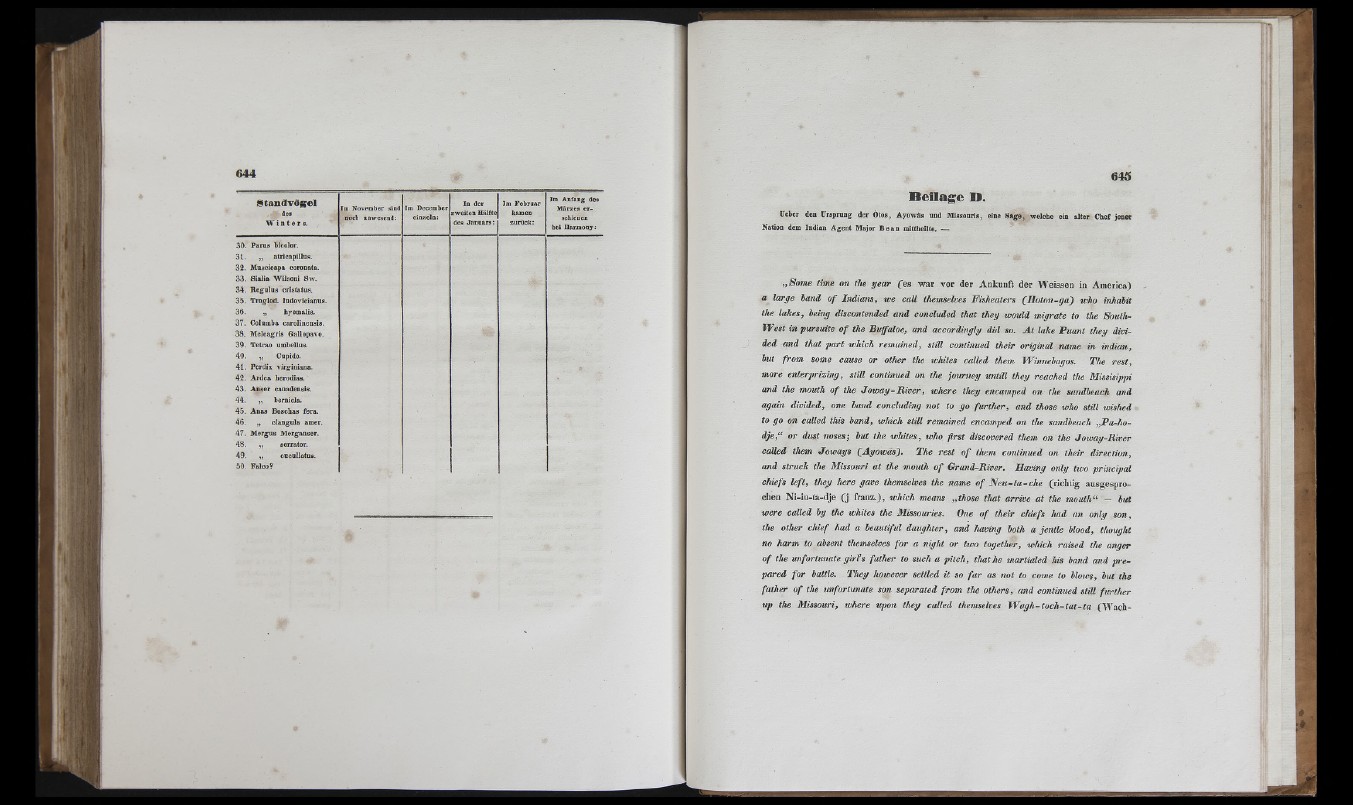
m
ü ta n d T ö g e l
W i n t e r s .
Im November sind
noch anwesend:
30. Pams bicolor
31. „ atricapillus.
32. Muscicapa coronata.
33. Sialia Wilsoni Sw.
34. Regulus cristalus.
35. Troglod. ludovicianus.
36. „ hyemalis.
37. Columba carolinensis.
38. Meleagrls Gallopavo.
39. Tetrao umbellus.
40. „ Cupido.
4 L Perdix virginiana.
42. Ardea herodias.
43. Anser canadensis.
44. „ bemicla.
45. Anas Boschas fera.
46. „ clangula amer.
47. Mergus Merganser.
48. „ serrator.
49. „ cucullatus.
50. Falco?
m December
einzeln:
In der
zweiten Hälfte
dea Januars:
Im Februar
kamen
zurück:
Im Anfang dea
Märzes erschienen
bei Harmony:
Beilage B.
lieber den Ursprung der Otos, Ayowäs und Missoniis, eine Sage, welche eia alter Chef je n «
Nation dem Indian Agent Major B e a n mittheilte. —
„Some time on the year (es war vor der Ankunft der Weissen iu America)
a large band o f Indians, we call themselves Fisheaters (Hoton-ga) who inhabit
the lakes, being discontended and concluded that they would migrate to the South-
W e st in pursuite o f the Buffaloe, and accordingly did so. A t lake Puant they divided
and that part which remained, still continued their original name in indiari,
but from some cause or other the whites called them Winnehagos. The rest,
more enterprizing, still continued on the journey untUl they reached the Missisippi
and the mouth o f the Jowa y -Rive r, where they encamped on the sandbeach and
again divided, one band concluding not to go further, and those who still wished
to go on called this band, which still remained encamped on the sandbeach ,,Pa-ho-
dje,“ or dust noses; but the whites, who first discovered them on the Joway-River
called them Joways (Ayowäs). The rest o f them continued on their direction,
and struck the Missouri at the mouth o f Grand-River. Having only two principal
chiefs left, they here gave themselves the name o f N eu -ta -ch e (richtig ausgesprochen
Ni-iu-ta-dje (j franz.), which means „those that arrive at the mouth“ — but
were called by the whites the Missouries. One o f their chiefs had an only son,
the other chief had a beautiful daughter, and having both a jentle blood, thought
no harm to absent themselves for a night or two together, which raised the anger
o f the unfortunate g irts father to such a pitch, that he martialed his hand and prepared
for battle. They however settled it so fa r as not to coma to blows, but the
father o f the unfortunate son separated from the others, and continued still further
up the Missouri, where upon they called themselves W a g h -to ch -ta t-ta (Wach